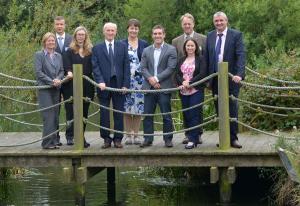A new understanding of Ireland’s lake ecosystems was presented last week when the findings of the DOLMANT (Development of targeted ecological modelling tools for lake management) project were the focus of attention at the Lough Neagh Discovery Centre. The research team involved in this three year project included staff from the project lead, the Agri-Food and Biosciences Institute, University of Ulster and Trinity College Dublin. The project was also supported by the Northern Ireland Environment Agency, Environmental Protection Agency and Inland Fisheries Ireland and was part funded through the EU’s INTERREG IVA Cross-border Programme, managed by the Special EU Programmes Body.

The project focused on over 50 lakes, including Lough Neagh and Lough Erne. Programme Manager, Dr. Yvonne McElarney, based at AFBI, explained the wider benefits of the project, “DOLMANT has created a management framework for lakes which included all of the major biological elements in lakes; this has not existed before.
Zooplankton, which are microscopic animals living in the water column have been included in a series of mathematical models resulting in practical lake management tools for use in the cross-border region. This has been achieved through the co-operation of cross-border organisations and researchers from AFBI, the University of Ulster and Trinity College”.
Professor Brian Rippey, of the University of Ulster, who examined a wide range of the characteristics of lakes, including Lough Erne, concluded that “our investigations tell us much about the complex interactions between water properties, phytoplankton, lake plants, zooplankton and fish in lakes. For example, a model developed for Lough Erne allows the impact of the invasive alien species, the Zebra Mussel, on the lake’s ecology to be used to inform lake management (policy)”.
Dr. Robert Rosell, principal investigator at AFBI, explains how the project assists in future management of fish in Lough Neagh. He said, “the results of the project demonstrate that a standardised draft net can be a very effective tool for fish population surveys. This links local fishery tradition and skills to scientific monitoring and demonstrates the value of co-operation between fishermen and scientists”.
AFBI’s Chief Executive Officer, Prof. Seamus Kennedy, summed up the significance of the project, “The DOLMANT project represents the best in collaborative projects - high-quality research with practical application which will inform environmental managers on the benefits of actions designed to improve the fauna and flora of lakes, through nutrient management, implementation of the Water Framework Directive, and applied fisheries management”.
Further information about the DOLMANT project
Notes to editors:
AFBI carries out high-quality technology research and development, statutory, analytical, and diagnostic testing functions for DARD and other Government departments, public bodies and commercial companies.
AFBI's Vision is “Scientific excellence in Northern Ireland … serving the world”.
All media enquiries to AFBI Press Office.
Latest news
- AFBI issues Nematodirus warning – Spring 2025 11 April 2025
- Managing Nature Based Risks to the UK Economy and Opportunities for Green Finance 08 April 2025
- AFBI Hillsborough host AERA committee 27 March 2025
- The Omics Days Conference 27 March 2025
